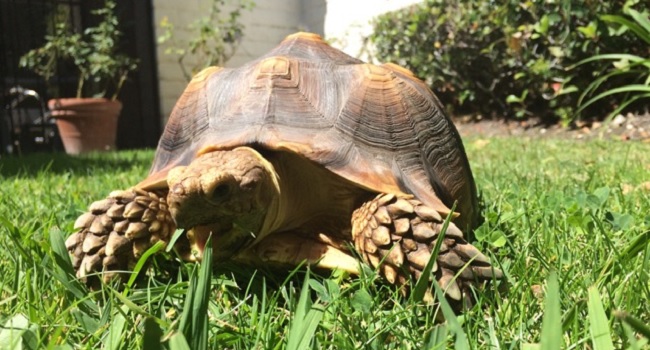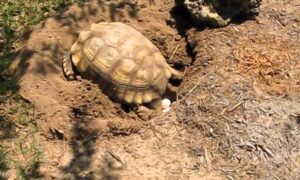Before getting a new exotic pet, it is important to make sure that it is legal to own in the state that you live. You don’t want to get attached to a new pet to later find out it’s illegal to own. You can be heavily fined for having an illegal pet.
As for sulcatas, sulcata tortoises are legal as pets in California. However, desert tortoises require a permit to own. Sulcata tortoises and desert tortoises have similar traits and are often confused, as they do look quite similar.
What Tortoises are Illegal as Pets in California?
Although sulcata tortoises are legal, in California, there is one tortoise that is illegal to own. The Desert tortoise is the only tortoise species illegal to own as a pet in California.
The following sea turtles are illegal to own as pets in California.
- Snapping turtles
- Loggerhead turtles
- Green sea turtles
- Leatherback turtles
- Hawksbill turtles
- Kemp’s ridley turtles
- Olive ridley turtles
- Flatback turtles
It is also illegal to own any endangered tortoise or turtle species.
In California, it is illegal to release your pet tortoise (or turtle) into the wild.
It is important to check with city and county laws when it comes to owning turtles.
California Native Species
With the exception of sliders, softshell and painted turtles, it is illegal to capture California native tortoises and turtles. When catching sliders, softshell and painted turtles, you need a sports fishing license.
- Common Snapping Turtle – Chelydra serpentina serpentina
- Desert Tortoise – Gopherus agassizii
- Northern Pacific Pond Turtle – Emys marmorata marmorata
- Red-eared Slider – Trachemys scripta elegans
- Sonoran Mud Turtle – Kinosternon sonoriense sonoriense
- Southern Pacific Pond Turtle – Emys marmorata pallida
- Texas Spiny Softshell – Apalone spinifera emoryi
- Western Painted Turtle – Chrysemys picta bellii
Why Are Some Animals Illegal as Pets?
Spread of diseases and parasites to humans and native animals.
Environmental concerns, like destroying crops or forming invasive populations.
Native species to the state.
Endangered species.
Human health and safety.
Welfare of the animal.
California Statement of Animal Welfare
The commission has determined the below listed animals are not normally domesticated in this state. Mammals listed to prevent the depletion of wild populations and to provide for animal welfare are termed “welfare animals”, and are designated by the letter “W”. Those species listed because they pose a threat to native wildlife, the agriculture interests of the state or to public health or safety are termed “detrimental animals” and are designated by the letter “D”.





